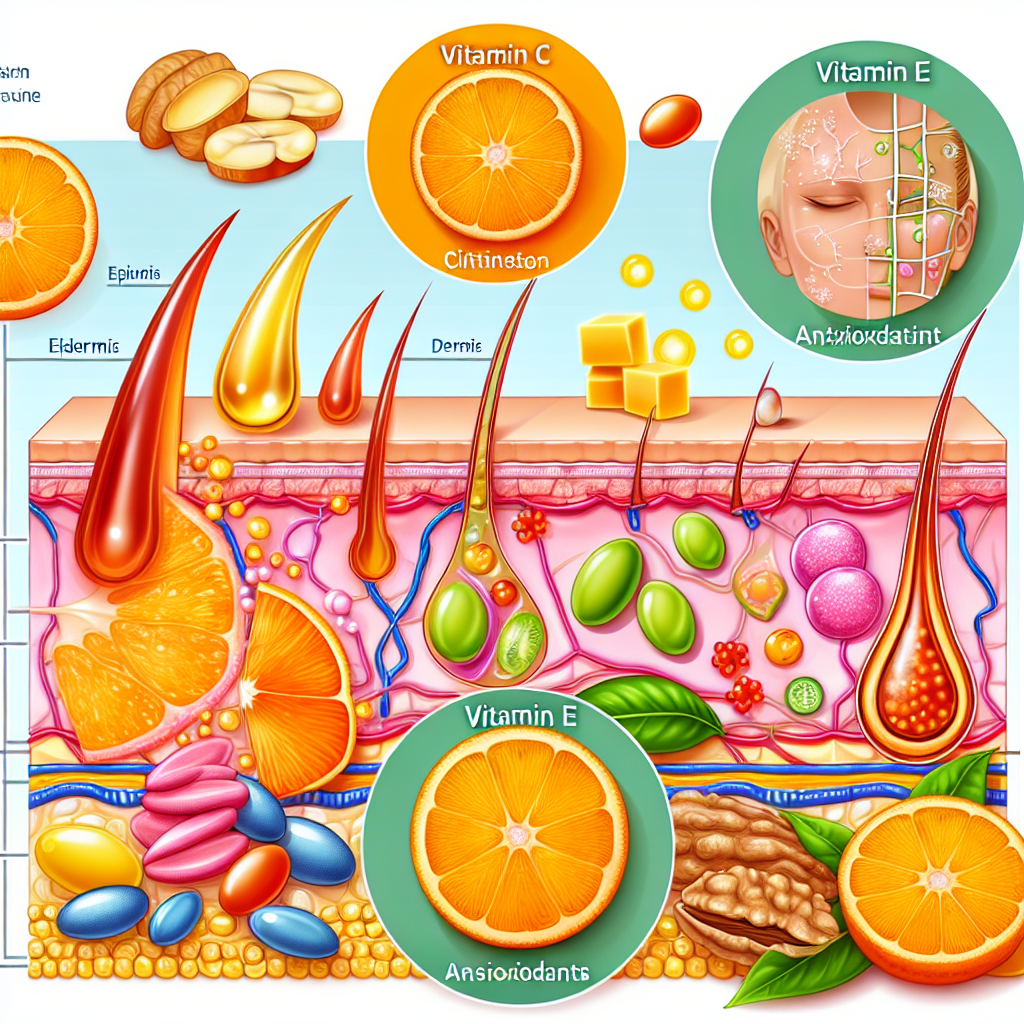How Vitamin C and E Keep Your Skin Glowing

Discover how Vitamins C and E can keep your skin glowing! Learn more about their benefits and how to incorporate them into your skincare routine. Don’t wait, start your journey to healthier, radiant skin today. Click here to find out more.
The Role of Vitamin C and E in Achieving Radiant Skin
The quest for radiant, glowing skin is a journey that many embark on, but few truly understand the science behind achieving this coveted glow. The secret to radiant skin lies not only in the products we apply topically but also in the nutrients we consume. Among these nutrients, vitamins C and E play a pivotal role in maintaining and enhancing the health and glow of our skin.
Vitamin C, also known as ascorbic acid, is a potent antioxidant that is crucial for the health of our skin. It plays a significant role in collagen synthesis, a process that helps maintain the skin’s elasticity and firmness. Collagen is a protein that gives our skin its structure, and as we age, its production naturally decreases, leading to wrinkles and sagging skin. By boosting collagen production, vitamin C helps to keep our skin youthful and firm.
Moreover, vitamin C is renowned for its ability to brighten the skin. It inhibits the enzyme tyrosinase, which is responsible for converting tyrosine into melanin, the pigment that gives our skin its color. By inhibiting this enzyme, vitamin C helps to reduce hyperpigmentation and dark spots, resulting in a more even and radiant skin tone.
On the other hand, vitamin E, also known as tocopherol, is another powerful antioxidant that protects our skin from damage. It works by neutralizing harmful free radicals that are produced by our bodies in response to environmental stressors like UV radiation and pollution. These free radicals can damage the skin’s cells, leading to premature aging and dullness. By neutralizing these harmful molecules, vitamin E helps to protect our skin and maintain its health and glow.
In addition to its protective properties, vitamin E also has moisturizing benefits. It strengthens the skin’s barrier function, helping to lock in moisture and keep the skin hydrated. Hydrated skin is plump and radiant, so by keeping our skin moisturized, vitamin E helps to enhance its natural glow.
Interestingly, vitamins C and E work synergistically to enhance each other’s benefits. Vitamin C helps to regenerate vitamin E, enhancing its antioxidant activity and allowing it to provide even more protection for our skin. This synergistic relationship between the two vitamins means that using them together can provide even greater benefits for our skin than using them separately.
In conclusion, vitamins C and E play a crucial role in maintaining and enhancing the health and glow of our skin. They protect our skin from damage, boost collagen production, reduce hyperpigmentation, and keep our skin hydrated. By incorporating these vitamins into our skincare routine and diet, we can help our skin to look its best and achieve that coveted glow. However, it’s important to remember that while these vitamins can provide significant benefits for our skin, they are not a substitute for a healthy lifestyle and good skincare habits. Always remember to protect your skin from the sun, eat a balanced diet, stay hydrated, and get enough sleep to keep your skin healthy and glowing.
Unlocking the Secret to Glowing Skin: The Power of Vitamins C and E

Unlocking the secret to glowing skin is a quest that many embark on, but few truly master. The beauty industry is saturated with products promising to deliver radiant, youthful skin, but the truth is, the key to achieving this lies not in expensive creams or serums, but in the power of vitamins C and E. These two vitamins, often overlooked in the pursuit of beauty, are potent antioxidants that play a crucial role in maintaining and enhancing the health and appearance of your skin.
Vitamin C, also known as ascorbic acid, is a water-soluble vitamin that is essential for the synthesis of collagen, a protein that provides structure and elasticity to the skin. As we age, our skin’s natural collagen production decreases, leading to the formation of wrinkles and fine lines. By boosting collagen production, vitamin C helps to maintain the skin’s firmness and elasticity, thereby reducing the appearance of these aging signs. Moreover, vitamin C is a powerful antioxidant that protects the skin from damage caused by free radicals, unstable molecules that can damage cells and contribute to aging and diseases. By neutralizing these harmful molecules, vitamin C helps to prevent skin damage and maintain a youthful appearance.
In addition to its collagen-boosting and antioxidant properties, vitamin C also plays a crucial role in skin brightening. It inhibits the enzyme tyrosinase, which is responsible for the production of melanin, the pigment that gives skin its color. By reducing melanin production, vitamin C can help to lighten dark spots and hyperpigmentation, resulting in a more even and radiant skin tone.
Like vitamin C, vitamin E is also a potent antioxidant that protects the skin from free radical damage. However, unlike vitamin C, which is water-soluble, vitamin E is fat-soluble, meaning it is stored in the body’s fat tissues and can provide longer-lasting protection. Vitamin E is particularly effective at protecting the skin from damage caused by exposure to ultraviolet (UV) radiation from the sun. By absorbing UV light, vitamin E helps to prevent sunburn and reduce the risk of skin cancer. Moreover, when applied topically, vitamin E can help to soothe and heal damaged skin, making it an excellent remedy for sunburn, scars, and other skin irritations.
In addition to its protective properties, vitamin E also helps to moisturize the skin. It strengthens the skin’s natural barrier, helping to prevent moisture loss and keep the skin hydrated. Hydrated skin is plumper, smoother, and more radiant, so by keeping your skin moisturized, vitamin E can help to enhance its appearance and give it a healthy glow.
In conclusion, vitamins C and E are powerful allies in the quest for glowing skin. They protect the skin from damage, boost collagen production, brighten the skin tone, and keep the skin hydrated. By incorporating these vitamins into your skincare routine, either through your diet or through topical application, you can unlock the secret to radiant, youthful skin. So, the next time you find yourself reaching for an expensive cream or serum, remember: the true secret to glowing skin lies in the power of vitamins C and E.
How Vitamins C and E Contribute to a Healthy, Glowing Complexion
Vitamin C and E are two essential nutrients that play a significant role in maintaining a healthy, glowing complexion. They are potent antioxidants that protect the skin from harmful free radicals, promote collagen production, and help to repair damaged skin cells. This article will delve into the science behind how these vitamins contribute to a radiant complexion and why they should be a part of your skincare routine.
Vitamin C, also known as ascorbic acid, is a water-soluble vitamin that is crucial for skin health. It is a powerful antioxidant that neutralizes harmful free radicals, unstable molecules that can damage the skin cells and accelerate the aging process. By neutralizing these free radicals, vitamin C helps to prevent premature aging and maintain a youthful appearance.
Moreover, vitamin C plays a vital role in collagen synthesis. Collagen is a protein that provides structure and elasticity to the skin. As we age, our body’s collagen production decreases, leading to wrinkles and sagging skin. By promoting collagen production, vitamin C helps to keep the skin firm and reduce the appearance of fine lines and wrinkles.
Vitamin C also has brightening properties. It inhibits the enzyme tyrosinase, which is responsible for melanin production. By doing so, it helps to fade dark spots and hyperpigmentation, resulting in a more even skin tone. Furthermore, vitamin C enhances the skin’s ability to heal itself, making it effective in reducing the redness and inflammation associated with acne.
On the other hand, vitamin E, also known as tocopherol, is a fat-soluble vitamin that is also a powerful antioxidant. It works synergistically with vitamin C to enhance its antioxidant effects. While vitamin C neutralizes free radicals in the aqueous or water-filled environments of the body, vitamin E does the same in the fatty or lipid-filled areas. This makes them a potent duo in combating oxidative stress that can lead to premature skin aging.
Vitamin E also has moisturizing properties. It helps to strengthen the skin’s barrier function, preventing moisture loss and keeping the skin hydrated. Hydrated skin is plumper, smoother, and has a natural glow. Moreover, vitamin E has anti-inflammatory properties. It helps to soothe and calm the skin, reducing redness and inflammation.
In addition to its standalone benefits, vitamin E enhances the effectiveness of vitamin C. It helps to regenerate vitamin C, allowing it to maintain its antioxidant properties for a longer period. This synergistic relationship between vitamins C and E makes them a powerful combination for skin health.
In conclusion, vitamins C and E are essential for maintaining a healthy, glowing complexion. They protect the skin from harmful free radicals, promote collagen production, and help to repair damaged skin cells. Moreover, they work synergistically to enhance each other’s effectiveness. By incorporating these vitamins into your skincare routine, you can help to keep your skin looking youthful and radiant. Whether you choose to get these vitamins through your diet, supplements, or topical skincare products, your skin will surely thank you.